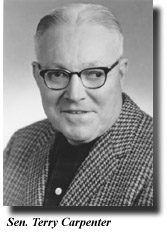Return to Notable Former Nebraska Legislators
Sen. Terry Carpenter
Return to Notable Former Nebraska Legislators
"They send men, not the boys, to deal with me in the Legislature."

One of the most controversial people to serve in the Nebraska Legislature was "Terrible Terry" Carpenter.
News accounts bestowed many other adjectives and phrases upon the seven-time Scottsbluff-area senator: "a giant among us," "a restless spirit," "contradictory," "inconsistent," "intimidating," "mercurial," "brilliant," "self-sufficient," "opinionated," "fearless," "anti-establishment."
Carpenter was on the ballot 19 times. He served as a U.S. Representative from 1933-1935 and a state senator from 1953-1955, 1957-1961 and 1963-1974. He ran unsuccessfully for the U.S. Senate five times and for governor four times.
The man was self-admittedly full of contradictions.
"I can introduce a bill in the morning and be opposed to it in the afternoon," he said.
He changed his political party affiliation five times in his lifetime.
He was known for his sharp, silver tongue and for skillfully using legislative rules to his advantage. As a political leader, he believed his duty was to "supervise the establishment."
His unconventional leadership made many adversaries. But Carpenter’s achievements also earned him admirers. His legislative accomplishments include:
- merging the municipal college in Omaha with the University of Nebraska system;
- daily educational television coverage of the Unicameral;
- opening committee executive sessions, historically closed to the public and the press, to full coverage by the press;
- legally empowering public employees to collectively bargain;
- achieving property tax breaks for elderly people with low incomes;
- aligning state income tax laws with the federal tax system, thereby assuring a progressive rate structure;
- construction of a state sports complex, now known as the Bob Devaney Sports Center.
Carpenter also made a name for himself beyond the walls of the Capitol.
Born in Cedar Rapids, Iowa in 1900, he was named after a famous boxer of the time, Terry McGovern. He first moved to Nebraska in 1916 and took over a gas station in Scottsbluff, where, in the middle of the Depression, he started gas price wars with major oil companies that had stations in the area. Eventually, the major companies bought the land beneath Carpenter’s gas station and evicted him.
The town rallied around Carpenter and raised enough money so that he was able to open another gas station. When the major companies again attempted to put him out of business by cutting off his suppliers, Carpenter built a railroad spur to his station, constructed a refinery, and made his own gasoline. His gas sold for 5 cents a gallon in some areas where the competition sold it for 20 cents a gallon.
An Omaha World-Herald newspaper editorial first coined him the name "Terrible Terry" during Carpenter’s gas wars in western Nebraska.
He pursued many other business ventures, from bricks and sand to cream, coal and soda pop. He was a millionaire by the age of 42.
On land he bought southwest of Scottsbluff, Carpenter erected his own town. Poor people were allowed to camp free of charge in Terrytown and were given free cream or milk. Many also found jobs there. More than 650 people reside there today.
Carpenter was a World War II officer in the Army Air Corps. After the war, people with children had difficulty finding housing. Carpenter allowed only people with children to live in his 48 Terrytown apartments.
In 1956, Carpenter took the national spotlight. He was a delegate to the Republican National Convention and startled the party by nominating an unknown Joe Smith for vice president instead of Richard Nixon.
Whatever his peers thought of Carpenter, all agreed at his death in 1978, that the man had a major influence on the lives of Nebraskans.
Sources: The Lincoln Star, Lincoln Journal, Omaha World-Herald and Nebraska Blue Book

 Legislature Video Library
Legislature Video Library